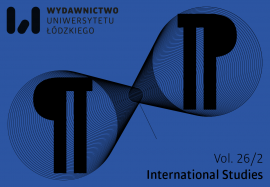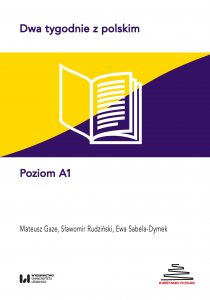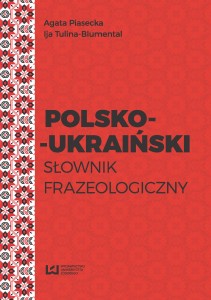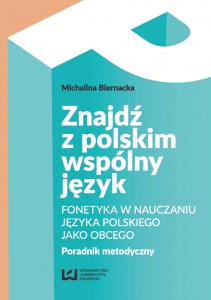International Studies Vol. 26 No. 2: Australia: Climate, Crisis and Change
Opublikowano: 25 kwietnia 2022

International Studies: Interdisciplinary Political and Cultural Journal (IS) to czasopismo poświęcone naukom politycznym i kulturowym w kontekście międzynarodowym. Jest to jedno z pierwszych tego typu czasopism w Europie Środkowo-Wschodniej, ale jego zakres nie ogranicza się do regionu; wręcz przeciwnie, redakcja stara się przybliżyć czytelnikom najciekawsze perspektywy i opinie na temat aktualnych problemów globalnych oraz nowatorskie badania z zakresu studiów międzynarodowych, kulturowych i politycznych. IS publikuje eseje, które różnią się tematyką i metodologią.
Zawartość czasopisma składa się z dwóch stałych części: „Artykuły” i „Recenzje książek”, ale mile widziane są również komentarze i spostrzeżenia czytelników w postaci „Listów do redakcji”, w których znajdują się odpowiedzi na artykuły publikowane w IS.
W numerze (PDF):
Monika Kończyk
The Consulate General of the Republic of Poland in Sydney is one of the thirty-seven consulates that function in Australia. The scope of duties and work of the consulate is set up by the rules and directives of the Polish Foreign Policy Strategy for 2017–2021 and is determined by the Consular Law and other regulations.
Krystyna Kujawińska Courtney
The article discusses the history of academic co-operation between the British and Commonwealth Studies Department at the University of Lodz and the Australian Embassy in Poland. Over the years the co-operation took the shape of a regular academic exchange and led to substantial academic, educational and cultural projects on Australia which resulted in a number of book-length studies.
Maria Łukowska
This contribution is an attempt at a different reading of Wojciech Gutkowski’s Journey to Kalopeia (1817), which may be of interest to both Polish and Australian readers in the twenty-first century, since it tries to connect Polish history with the dream of the Antipodes represented by Australia. Gutkowski’s book, unknown until 1913, when it was deemed a utopian novel of little scientific value, gained recognition in the 1950s, 1960s, 1970s and 1980s. At that time it was studied as a political treatise and an Enlightenment model for the creation of an ideal utopian-socialist-communist state. This paper offers a new reading of the work in question, discussing its cultural-historical aspects as a precursor of a specifically Polish model of a utopian-colonial state.
Joanna Siekiera
Understanding of the Rule of Law in the Antipodes
Understanding the rule of law in the Antipodes, that is in the Commonwealth of Australia and New Zealand, as a legal value is clear to both of these societies. The rule of law, oftentimes called the state of law, is the basis of the system of values, as well as legal culture, which determines which social values are legally protected and how high their position de facto and de iure is. The hierarchy of the rule of law in the Antipodes shows undoubtedly how various legal norms, unwritten and those codified ones, protect the democratic system with all its principles, along with the rights and freedoms of citizens and persons residing in these two countries.
Agnieszka Kandzia-Poździał
The Coronavirus Pandemic and Its Consequences on the Australian Economy in 2020
The fight against the Coronavirus continues around the world. The pandemic affects individuals and families and social groups, states, and economies. Like any other economy in the world, Australia’s economy has to deal with the effects of a pandemic. Australia has chosen its own way of fighting the disease and its consequences. It was not possible to avoid an economic recession, but at the same time, political decisions, aid provided, and social behaviour can be assessed as very effective.
Jowita Brudnicka-Żółtaniecka
Societal Security Trust Issues in Australia during the COVID-19 Pandemic in 2020
In late December 2019 and early January 2020 the first cases of a new coronavirus occurred in Wuhan. It is a virus characterised by similarities to SARS (Severe Acute Respiratory Syndrome) and MERS (Middle East Respiratory Syndrome). On January 25, 2020 the initial case of infection by SARS-CoV-2 caused the disease COVID-19 in an Australian patient who later died from it. During my PhD thesis defence in September 2018 I would not have thought that one of the possible security scenarios which I designed for the South Pacific region, related to epidemic threats, would soon come true. Despite some obvious and high indicators resulting, for example, from a geopolitical location in the vicinity of China, the probability of an epidemic outbreak seemed nigh unbelievable. This article focuses on societal security. It is impossible to make a solid analysis of an epidemic impact on societal security in various countries in a single article; therefore, I concentrate specifically on the case of Australia. The goal of this article is to explain how Australians cope with the epidemic and if they are prepared for a drastic change in their lifestyles. Do they put trust in governmental institutions? What issues appear to be main societal threats in Australian society during the pandemic? I conclude with thoughts about new societal directions that are going to be implemented should the scale of the pandemic persist. Due to limited length, my overview is not exhaustive; instead, it focuses on core findings about the condition of Australian society during the pandemic.
Anna Kowalcze-Pawlik
“Time Has Caught on Fire:” Eco-Anxiety and Anger in Selected Australian Poetry
This essay discusses fire as a significant factor shaping Australian social and cultural life. It focuses first on the climate-change induced emotions such as eco-anxiety and anger that can be tied with the Australian landscape, and then moves on to a discussion of the presence and function of fire in selected contemporary Australian poetry. The reflection on the poetics of trauma in the second part of the essay is accompanied by a discussion of solastalgia connected with land dispossession as an experience of the First Nations expressed in the Aboriginal literature in English.
Zapraszamy do lektury!
Komentarze
Ten post dostępny jest także w języku: angielski





